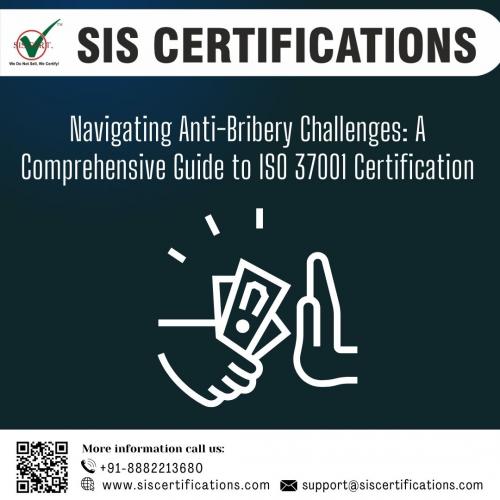Navigating Anti-Bribery Challenges: A Comprehensive Guide to ISO 37001 Certification

Navigating
anti-bribery challenges is critical for organizations to maintain integrity and
compliance with legal and ethical standards. ISO 37001 certification provides a
comprehensive framework for establishing, implementing, maintaining, and
improving an anti-bribery management system (ABMS).
Here's a
guide to ISO 37001 certification:
Understanding
ISO 37001: ISO 37001 is an international standard that outlines
requirements and guidelines for implementing an effective anti-bribery
management system. It provides a systematic approach for organizations to
prevent, detect, and respond to bribery and corruption.
Assessing
Risks and Vulnerabilities: The first step in achieving ISO 37001
certification is to assess the organization's risks and vulnerabilities to
bribery and corruption. This involves identifying key bribery risks, such as
interactions with government officials or high-risk business partners, and
evaluating the potential impact of these risks on the organization.
Developing
Policies and Procedures: Organizations must develop comprehensive
anti-bribery policies and procedures in line with ISO 37001
requirements. These policies should cover areas such as gifts and
hospitality, conflicts of interest, facilitation payments, and reporting
mechanisms for suspected bribery incidents.
Implementing
Controls and Measures: ISO 37001 requires organizations to implement a
range of controls and measures to prevent and detect bribery. This may include
due diligence processes for third parties, training and awareness programs for
employees, whistleblower hotlines, and regular monitoring and review of
anti-bribery activities.
Ensuring
Management Commitment: Management commitment is essential for the
successful implementation of ISO 37001. Senior leadership must demonstrate a
commitment to anti-bribery principles and provide adequate resources and
support for the ABMS.
Training and
Awareness: ISO 37001 emphasizes the importance of training and awareness
programs to ensure that employees understand their responsibilities regarding
bribery and corruption. Training should be provided to employees at all levels
of the organization, with specific focus on high-risk areas and roles.
Monitoring
and Review: ISO 37001 requires organizations to regularly monitor and
review their anti-bribery activities to ensure effectiveness and compliance
with the standard. This may involve conducting internal audits, reviewing
performance indicators, and addressing any non-conformities or areas for
improvement.
Seeking Certification: Once the ABMS is fully implemented and operational, organizations can seek certification against ISO 37001 through an accredited certification body. Certification provides independent verification that the organization's anti-bribery management system meets the requirements of the standard.
Achieving ISO
37001 certification demonstrates to stakeholders, including customers, business
partners, and regulators, that the organization is committed to preventing
bribery and corruption and operates with integrity and ethical conduct. It also
helps mitigate legal and reputational risks associated with bribery and
corruption, thereby safeguarding the organization's long-term success and
sustainability.
Comments